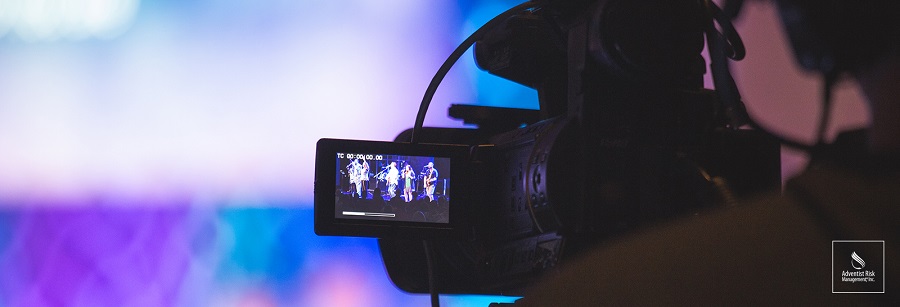With the expansion of social media, there’s never been a more opportune moment to share one’s faith and ministry. Many churches see the rise of live streaming sites such as YouTube, Facebook Live, Periscope, and even Instagram as helpful tools to expand their membership globally through live streams of the church service. Churches also archive previous services and special events on their website or YouTube channels to allow members to rewatch and share the videos. But with opportunity comes new risks, and it is important to address these in the planning stage. Before you add more money to your church’s media budget, take a moment to consider the following legal risks and how you might address them.
COPYRIGHTED CONTENT
While many local churches have good intentions about their use of materials, it helps to double check the source, and verify if it is copyrighted or in the public domain. Copyright is “the exclusive legal right to reproduce, publish, sell, or distribute the matter and form of something (such as a literary, musical, or artistic work), according to Merriam-Webster.com. Copyrights protect the individuals who create the original work, not the people who use the work."Copyrights protect the individuals who create the original work, not the people who use the work."
For example, you may not realize that the songs you sing in the hymnal or the praise music that appears on the screen are copyrighted. You may have secured a license from Christian Copyright Licensing International (CCLI) or Christian Copyright Solutions to post lyrics on the screen, but did you know you need to check to see if that license includes streaming? Even different versions of the Bible are copyrighted, and one must provide credit depending on how they are used. When you display scripture, display song lyrics on a screen, or use a video clip in your sermon as an illustration, you must receive the necessary permission and provide appropriate credit. Consider using licenses from CCLI or Christian Copyright Solutions created specifically for the use of music in churches. You may also receive permission to use newly released videos from Christian Video Licensing International.
Churches Need Permission Too
There’s a common misconception that churches have more freedom to use these works because they are a non-profit, it is used under the “Fair Use Act,” or even that it is for the sake of ministry. When tempted by Satan in the wilderness, even Jesus sourced Old Testament scripture. “Jesus answered, ‘It is written: ‘Man shall not live on bread alone, but on every word that comes from the mouth of God.’” (Matthew 4:4, NIV)Because live streaming is just that, LIVE, you are not able to edit it to avoid copyright infringement. Streaming sites like Facebook and YouTube have policies and procedures in place to detect illegal copyright use and may block or shut down your account if you are noncompliant. If your live event is in violation, it is highly probable that your archived version of the event will be as well. Take every precaution ahead of time to guarantee your presentation is free of copyrighted material before filming begins. All permissions must be documented and in place when copyrighted material is used.
LOCATION CONCERNS
Live streaming can take place just about anywhere. It is ideal for those who want to “go ye therefore…” but be mindful of where you live stream. You must have permission to film or live stream wherever you are. If you are filming your youth group distributing bagged lunches to needy community members in a local park, first get permission to be there. While you are in a public space, it doesn’t mean you have an absolute right. Work with your city or county offices before the event to obtain permission to film or live stream. If the live stream takes place on your church’s property, the liability is minimized but other factors may be involved including personal privacy.PRIVACY AND RIGHT OF PUBLICITY
Everyone has a right to control personal information and to give permission when their identity is used for commercial promotion. The Cornell Law School’s Legal Information Institute says the right of publicity “prevents the unauthorized commercial use of an individual’s name, likeness, or other recognizable aspects of one’s persona.” Why is this important for nonprofit organizations like local churches?During live streamed or videotaped events, audience members must give permission to film their likeness. While it may be difficult to get everyone who enters your sanctuary to sign a model release form, notify them that they may appear on television or online, either in a live or archived program. The notification can be done in a variety of ways:
- a live announcement before the service,
- a notice posted outside the room where the service is being held,
- or even a message printed in the bulletin, event program, or on the church’s website.
Churchproduction.com has another suggestion for those camera shy. “Your church might consider designating part of the sanctuary that won't be on camera. This doesn't need to be a separate room. It could just be the side of the sanctuary where there are fewer cameras….People who'd prefer not to be shown on video could make one of these shoot-free zones their preferred seating area.”
Filming or posting pictures and videos of children online is never advised unless you have the permission of the parent or guardian. It is more helpful to have this permission in writing. Before any event, be sure to alert parents to any potential on camera appearance by their little ones. Schools might ask parents or guardians to sign permission slips at the beginning of the school year, or Pathfinder groups might do the same before special events or a Camporee. Some parents may have genuine concerns about their child’s image appearing anywhere online, and it is important to treat those concerns seriously and with respect.


